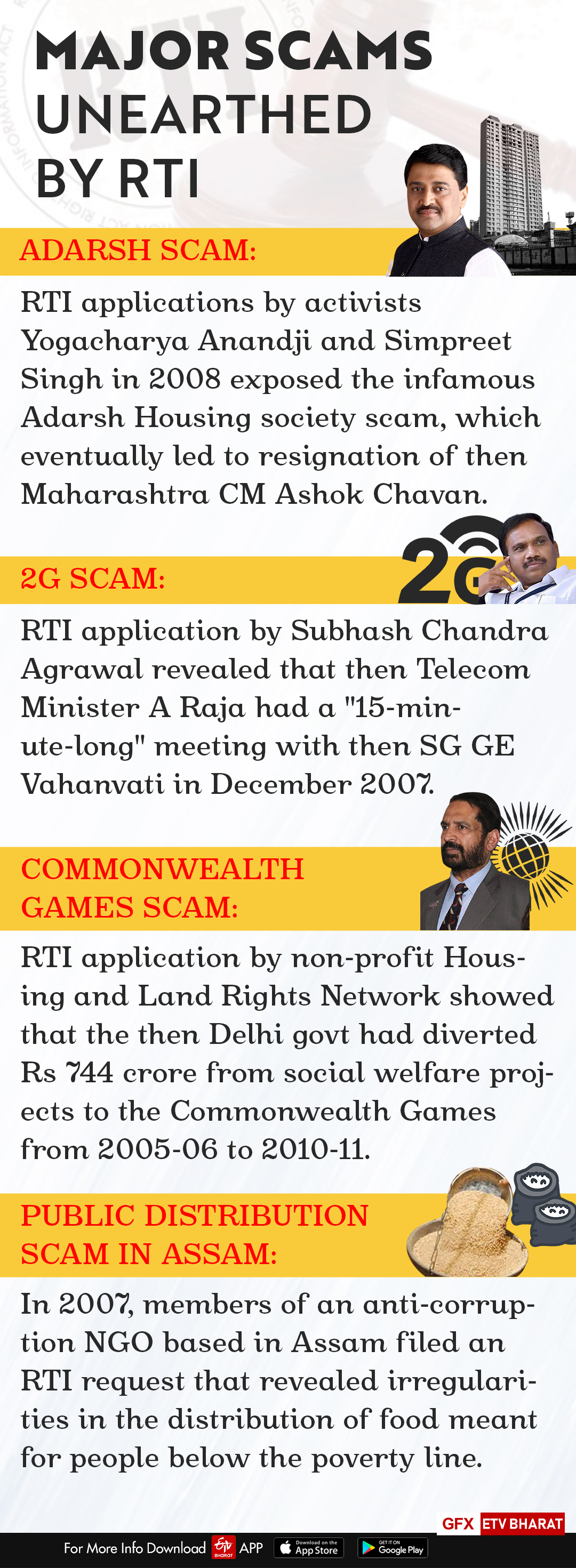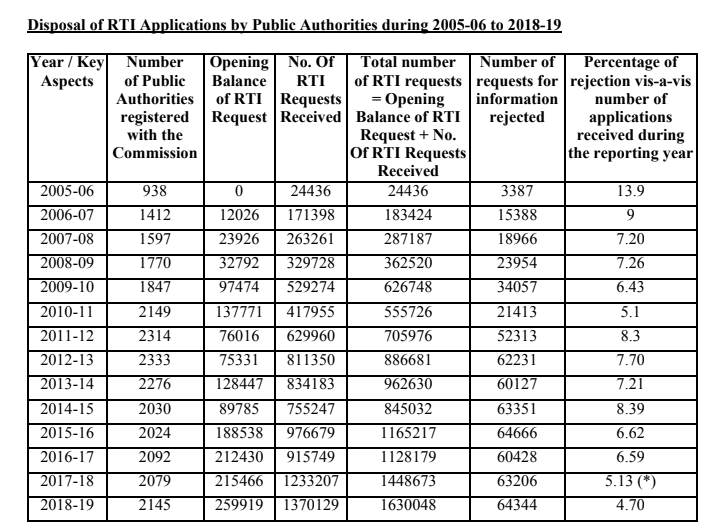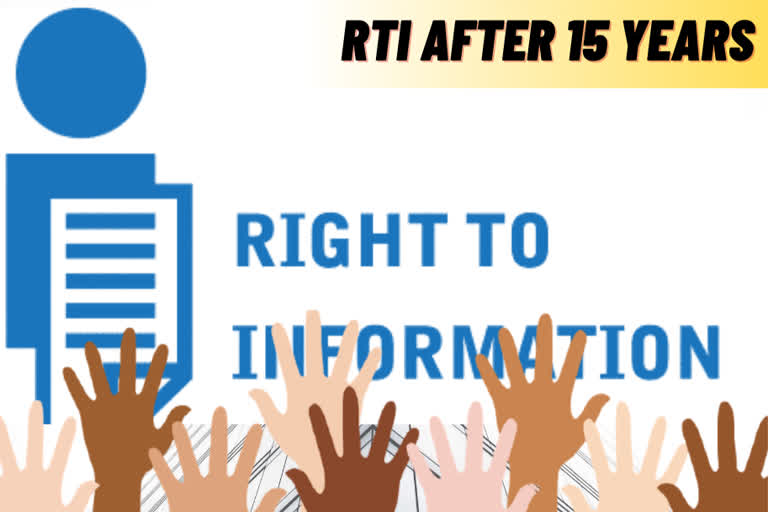Hyderabad: Fifteen years after the Right to Information (RTI) Act came into force, more than 2 lakh cases are pending at the Central and State Information Commissions, which are the final courts of appeal under the transparency law.
The RTI Act has ensured a substantial positive change in government functioning, but it has not been a cakewalk for the applicants who have regularly been victimised for exposing wrongdoings in public offices.
Around 20 cases of murder, 45 cases of assault and 73 cases of harassment of RTI users have been reported from all across India from as early as 2007. RTI activists have been killed since 2005 and 365 more have been assaulted, harassed or threatened.
A report compiled by CHRI revealed that while there were no cases in the first three months of the implementation of the RTI Act in 2005, attacks occurred in all subsequent years, with 2011 being the most violent (83 cases of attacks on RTI users were reported).
Thereafter, the incidents have shown a constant decline – falling to 36 in 2013, 26 in 2014 and 21 incidents in 2015. With two-and-a-half months still to go, there have been 14 cases of attack on RTI users in 2016.
The details of the RTI applicant will not be kept confidential from the person whose information the applicant seeks. In fact, a copy of his application would be made available to the concerned person/organisation. However, when a third party seeks the details of an RTI applicant, then Section 11 of the RTI Act would attract and the request will be examined as prescribed therein.
The need for a Whistleblower Protection Act has been expressed by all the activists who use RTI as a medium to expose corruption. But the government’s inaction on this subject has unfortunately caused a number of deaths all over the country in the last few years.
RTI activists have claimed that revealing names of information seekers had become a practice for PIOs of various departments.
As a result, the RTI applicants are pressurised and sometimes inducements are offered to withdraw the application. In cases involving contracts, the affected contractor may feel threatened by the disclosure and try to stop the flow of information by all possible means.
Part of the effort has also been to afford protection to the RTI Act from any attempt to weaken it by those in power and being called "public" authorities. To push the boundaries of the RTI regime and make it deeper and wider in coverage, participation, and impact is a matter of gaining rapid importance.
The increasing efforts to look at the Constitutional perspective and newer applications bringing out loopholes in the form of relevant questions can be seen here.
Types of demands which could be made under RTI
- Demand samples of materials used for the construction of roads, drains and buildings etc.
- Demand inspection of any social development work, work in progress or information related to any completed work.
- Demand inspection of government documents, maps for the construction, registers and records.
- Demand information related to the progress made on any complaint filed by you in the recent past.
15 years of attacks on RTI activists

Problem with RTI data
- One major constraint faced by PIOs in providing information in a timely manner is the poor state of record management in most public authorities.
- There are huge and growing delays in the disposal of cases in many of the information commissions, with the pendency of cases growing every month. At the current levels of pendency and rate of disposal, an appeal filed today with the Madhya Pradesh SIC would be taken up for consideration only after 60 years, while the West Bengal SIC would come to it after nearly 17 years.
- A very small proportion of the penalties imposable under the RTI Act (less than 3.7% on the basis of our current estimate) are actually imposed by commissions. Though further research needs to be done on this aspect, preliminary data suggests that there is a correlation between the number of penalties imposed and both the willingness of PIOs to make information available and the number of appeals and complaints that land up with information commissions.
- The mechanisms for monitoring the implementation of the RTI Act, and for receiving and assimilating feedback, are almost non-existent.RTI at 15

Utilizing RTI effectively to combat corruption
Imparting proper on-the-job training to PIOs: PIOs should be given proper training both before and during their tenure so that they can apply their minds independently and decide whether the information can be given and to what extent. They must be made to understand the purpose of the legislation and their own significance in exposing corruption and accelerating the country’s development.
Changing the Composition of the Committee for the Appointment of PIOs - Under Sections 12 and 15 of the RTI Act, the Chief Information Commissioners and Information Commissioners at both Central and State Government are appointed by a committee headed by the Prime Minister and the Chief Minister, respectively, and comprising the opposition leader and a Cabinet Minister to be nominated by the Prime Minister/Chief Minister.
ALSO READ: Election Commission clarifies on RTI activist's allegations of sharing electoral data
This structure is slightly misbalanced because out of the three people appointing, two are a part of the ruling government. Therefore, this may give rise to circumstances wherein the government appoints its own loyalist to the post to ensure that the whistleblower is kept at bay.

In the present scenario, where PIOs are already reluctant to give information, this could be dangerous. Thus, it is suggested that the Chief Justice of the Supreme Court or his/her nominee should also be a part of the Committee that appoints Information Commissioners. There should not be any veto power and the decision by the majority should be final. This will ensure a proper check-and-balance system.
Prohibiting Disclosure of Applicants’ Details: There have been instances of government leaking information about the details of the RTI applicants, which has subjected the latter to blackmailing, threats and even death. Not only should the Whistleblowers Protection Act be strictly enforced, but also a specific provision should be imposed in the RTI Act that prohibits disclosure of details of the RTI applicant and imposing a punishment to those, who act on the contrary.
Constituting Separate Benches: To reduce the backlog of appeals pertaining to the RTI Act in the High Courts and the Supreme Court, separate benches may be constituted both in the High Courts and the Supreme Court to dispose of the matters quickly.
Adequate Staffing: The recruitment in government departments must match the vacancies. Overburdening of work on the shoulders of a few is also one of the reasons for an incessant denial of information.
Digitising all Records: Compulsory digitisation of records must be done. The government can make use of the skilled but unemployed youth in the country to do the same.
Broadening the Scope of Public Authorities: The definition of “public authorities” under Section 2(h) of the RTI Act is a bit narrow and should be broadened to include all bodies and institutions that discharge public functions, though they may not come within the ambit of State as per Article 12of the Indian Constitution.
ALSO READ: Khasgi Trust case: Bhopal RTI activist talks to ETV Bharat



